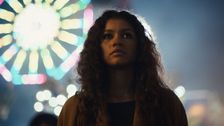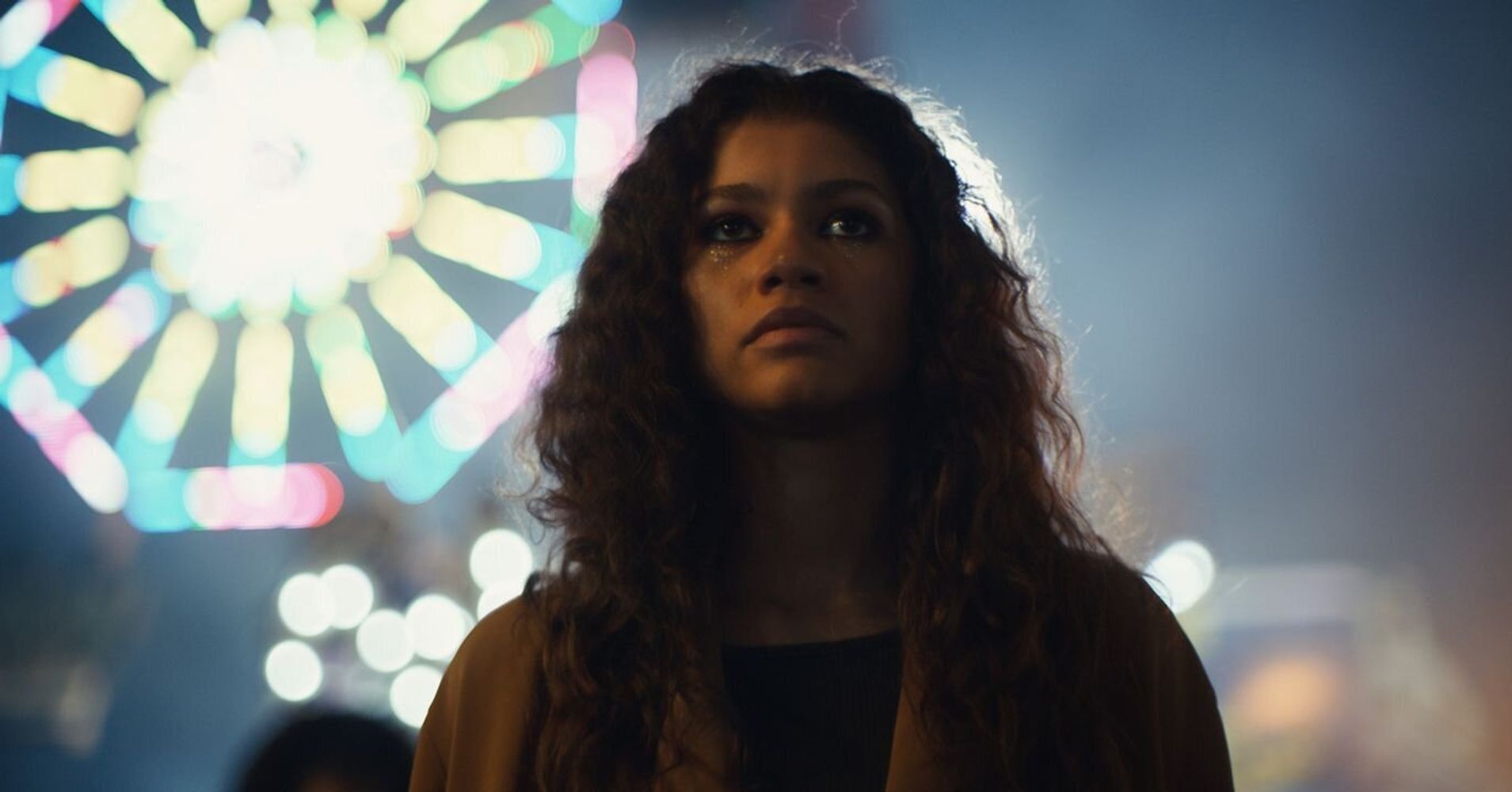[ad_1]

In “Euphoria,” Zendaya plays Rue, a 17-year-old living in the suburbs who has just gotten out of rehab ― with no actual plans to stay sober. With an acerbic sense of humor, she narrates her life and those of the kids from her high school, as she grapples with her addiction, her intense relationship with a new best friend named Jules (Hunter Schafer), and the general chaos of the lives of those around her.
In Episode 1, we watch jock McKay (Algee Smith) and popular girl Cassie (Sydney Sweeney) begin to have sex. At one point, McKay, taking his friends’ advice that he should be rough with Cassie because she apparently has a “reputation,” starts to choke her. The scene freezes, and Rue’s voice reenters the narrative. “Now, I know this looks disturbing but for real,” she says, “I promise you, this does not end in a rape. But here’s the thing … ”
With scenes like this, it comes as no surprise that the current conversation surrounding “Euphoria” ahead of its June 16 premiere is the fact that it is incredibly raunchy ― graphic sex, nudity and drugs run rampant over its six-episode season. The HBO series, which is the cable network’s first teen drama, is produced by writer/director Samuel Levison of ”Assassination Nation” fame, and premieres Sunday.
What’s frustrating is that there hasn’t been much talk about the fact that “Euphoria” is the first teen TV drama centered on the life of a teenage black girl. Zendaya joins Yara Shahidi, who currently stars on the Freeform comedy “Grown-ish,” as one of only two young black girl leads on TV right now. (Both of whom, it must be acknowledged, are light-skinned and wavy-haired ― arguably Hollywood’s favorite version of black girl.) It’s significant that Rue’s story is at the center and the heart of this ensemble drama, a rarity in a television landscape that often regulates black girls’ stories to B and C storylines.
It’s disappointing to consider that there are so few shows that center black teenage girls, given the extensive list of comedies and dramas in film and television about white teenage girls ― everything from “90210” to “Clueless” to “Clarissa Explains It All” to “Buffy” to “Veronica Mars” to “Lady Bird” and “Booksmart.” Meanwhile, there are very few coming-of-age stories specifically about black girls in television and film, especially those in the mainstream.
The dearth of coming-of-age stories about black girls is heavily predicated on the fact that, so often, black girls aren’t given the space to even be girls.
If pressed to think of any, one can conjure up movies like “Crooklyn,” “Just Another Girl on the IRT,” “Girlhood,” “Pariah,” “Eve’s Bayou,” or the seminal sitcom “Moesha” starring Brandy in the titular role. However, none have really done quite what “Euphoria” sets out to do, which is reimagine the traditional teen drama — in the style of “Degrassi” or “My So-Called Life” — as a dark portrait of Gen Z. “Euphoria” is attempting the ambitious undertaking of creating an unflinching portrait of a generation, albeit a heightened one.
Race itself is on the periphery of “Euphoria” ― if the show has any statements to make about identity, it’s about the complexity of identity. Throughout the series, we see Rue struggle with her constant feelings of anxiety, her self-hate, her addiction. Race never comes up explicitly, though it certainly hangs in the atmosphere as we watch Rue navigate her predominantly white, suburban teenaged experience ― perhaps this is a missed opportunity. It’s hard to say.
The dearth of coming-of-age stories about black girls is heavily predicated on the fact that, so often, black girls aren’t given the space to even be girls. They’re often hyper-sexualized from an early age, and if they take the initiative to be intentional about exploring their sexuality, they’re deemed as “fast.” Unlike white teens, black girls are rarely given room to mess up, to make mistakes, to grow. Rue is a game-changing character in this sense because she is, by her own admission, the ultimate fuck-up. Since the story is told from her point of view, we’re put in a position where we can empathize with her.
Rue runs the narrative, indeed. But it’s also powerful that Rue’s story isn’t simply the main story ― the lives of the other characters are also under her control. This storytelling approach further cements her importance, her necessity, her voice.
In that moment with her two classmates in the first episode, Rue goes on to add her own sharp, cynical commentary, creating context as she delivers a monologue on how most porn has influenced the way people, especially teens, have sex. “This shit isn’t out of left field,” she explains, as McKay and Cassie’s scene unfreezes. The fact that Rue literally controls the pace of the storytelling, and that her opinions and observations drive the themes of the overall piece, is something new, and something exciting.
One question that kept coming up in watching the first few episodes of the show was what I, at 17 or 18, would have thought of it. The show, after all, may have so-called “adult” themes and imagery, may offer up a voyeuristic glimpse of teen life in 2019 to 30-something year-old and beyond viewers, but it’s aimed at a specific demographic: teenagers. It is imbued with that potent cocktail of cynicism and hope that dominates the way you navigate the world at that age. There was no Rue for me at 17, but it’s gratifying to know that there will be, now, for other girls.
Value is often ascribed to representation simply for being. Words like “necessary” and “important” are slapped on to pop cultural properties that feature marginalized characters or tell marginalized stories, regardless of what the stories or who the characters actually are. These sweeping generalizations miss the point, because the value of representation isn’t its existence for existence sake, but specificity and intentionality.
It isn’t that Rue exists, but how she exists — fully in control of her narrative even if she isn’t in control of her life — that makes her special.
REAL LIFE. REAL NEWS. REAL VOICES.
Help us tell more of the stories that matter from voices that too often remain unheard.
[ad_2]
Source link

